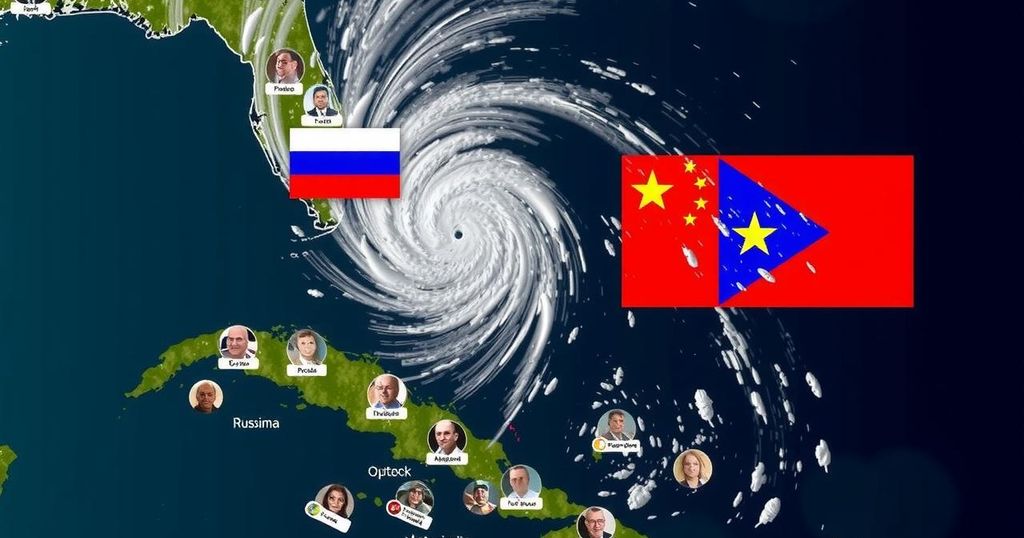A U.S. official has reported extensive misinformation campaigns executed by Russian, Chinese, and Cuban operatives regarding the government response to hurricanes Helene and Milton. Disinformation tactics included AI-generated imagery and persistent themes suggesting misallocated disaster relief funds. The concerns raised by this foreign activity illustrate the broader implications of misinformation on public safety and trust, emphasizing the need for increased government response.
A recent statement from a U.S. official revealed that Russian, Chinese, and Cuban operatives have been disseminating misinformation regarding the government’s response to hurricane relief efforts following Hurricanes Helene and Milton. The official highlighted various tactics employed in this disinformation campaign, including a China-associated social media account that utilized an AI-generated likeness of Vice President Kamala Harris standing over flood damage, juxtaposed with a misleading sign falsely asserting that U.S. financial resources were allocated to Ukraine, Israel, and Taiwan instead of to hurricane aid. Additionally, a Russian state-owned news agency circulated another AI-generated image on Telegram depicting a flooded Disney World and shared numerous provocative claims suggesting that the U.S. government was withholding disaster-relief funds from citizens. Furthermore, operatives from Cuba have been promoting narratives indicating that American support for Israel and Ukraine has diverted critical resources away from domestic relief efforts, resonating with themes posited by both Russia and China. This declaration marks the clearest indication from U.S. government sources regarding the international spread of false information concerning the hurricanes that impacted the country in September and October. It is notable that much of the misinformation about the federal relief operations has also originated domestically, with prominent figures, including billionaire Elon Musk, contributing to the spread of fallacious claims. Particularly, sensational allegations that disaster funds were being misappropriated to benefit migrants gained significant traction. Concerns have escalated around such covert foreign operations as they may amplify misinformation and incite violent reactions, illustrated by a recent arrest of a North Carolina man for threatening FEMA employees engaged in relief efforts. Additionally, this disinformation campaign coincides with heightened foreign engagement in spreading misleading narratives about the impending presidential election, particularly from nations such as Russia, China, and Iran. In response to the alarming dissemination of falsehoods regarding hurricane relief, President Joe Biden requested an update from his team aimed at reinforcing the federal government’s digital strategy to counter this misinformation, urging increased visibility of government efforts through social media. However, the intelligence update did not contain any mentions of Iran’s involvement despite prior reports of Tehran’s active attempts to sow discord among the American populace.
This article addresses the growing issue of misinformation being spread by foreign entities, specifically Russia, China, and Cuba, regarding the U.S. government’s response to recent hurricanes. The disinformation campaigns have employed sophisticated techniques, including the use of AI-generated images and social media platforms, to mislead the public about the allocation of hurricane relief funds. The increasing presence of misinformation, particularly from foreign sources during significant events such as natural disasters and impending elections, raises concerns about its potential to incite violence and unrest, thereby necessitating a robust response from U.S. officials to safeguard public trust and accurate information dissemination.
The article underscores the alarming trend of foreign misinformation campaigns targeting the United States, particularly in the aftermath of natural disasters and during critical election periods. The actions of Russian, Chinese, and Cuban operatives expose the vulnerabilities inherent in the information landscape and highlight the essential need for vigilant and effective countermeasures by U.S. officials. As these foreign entities exploit both international and domestic channels to sow discord, there exists an urgent imperative for proactive engagement by government agencies to ensure transparency and trust among the populace. The overarching narrative emphasizes the importance of discernment in media consumption and the vigilance required to combat the far-reaching influences of disinformation.
Original Source: www.cnn.com






